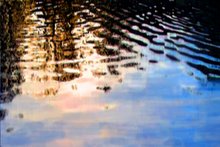
Prelude
Pilgrims from the first bare encampments,
founders of the ancient cities of the self,
the stone skulls peer astonished through glass
into the spotlit, busy murk of the museum.
Sifted from strata deeper than temple-dust,
below the fractured titans, the ruined pots,
these crumbs and shards of reassembled earth
were each the pinnacle of evolution;
these reliquary smiles could be
the risen faces of our absconded gods.
They made us in their image, did they not?
Our eyes would still be quite at home
in these sturdy orbits; something persists,
echoes like chants in these stone vaults,
cranial cathedrals, apsed and buttressed
by the patient toil of learning to survive,
our dwelling place in all generations.
With their teeth we chew our daily bread,
and as we spin ingenious hymns of praise
the hands they built for us are on the keys.
First, some manmonkey monkeyman.
Upright skillet-head, stick-wielder,
fringe-dwelling author of us all:
an empty case, a vacant pedestal.
Fond of an unlatined, timeless privacy,
they survived when Eden chilled and dwindled,
cast them into a wilderness of grass.
They reaped with watchmaker’s fingers, learned teeth
to mill their seeds, grubs, berries, bones,
into the architecture of our mortal coil.
Allemande
Homo habilis, handy man,
naked systems analyst,
head only slightly larger
than the planed-down vogue,
slim-jawed, smiling human.
Outmuscled, outnumbered
by bush-nibbling brutes,
they brought technology to bear,
learned to gather what they found
in folded leaves, strips of bark,
to carry back, share with the others.
Sharing made them masters of the earth
for more than two million years,
gentle and creative gods
with time to look to our devising.
Courante
Ecce erectus: a piece of work.
Low-domed homer, logophone,
stole more than fire from the sky:
they woofed language to a warp of flame
to weave a mail of culture at their hearth,
filaments of fact and fire-dream
combining to domesticate the world.
They’d pass unnoticed on the football field,
but in the locker room there might
be smirks at the box turtle skullcap,
ledge of brow, yet some had brains
as big as some of ours. Because
they lived by their wits, wit lived,
eased their march across Africa,
Europe, China, Indonesia.
Think of them when you hear tales
of Nimrod or Prometheus;
bless them when you lie awake
in the deep night gazing up
at the high, white moon to question
the implicit miracle of being.
Be sure they did it too. You are the answer.
Sarabande
The old man had been sick a long time, so it came
as no surprise when he finally went, though everyone
did feel a bit anxious about the future
now that he was gone. Everyone’s teacher, he knew
the herds, the snow, the plants for wounds, those for burns,
which to brew for tea against fevers, knew
the words of the other people, enough to treat with them,
exchange the meat and skins for honey, baskets, fish.
When his sons had hollowed out his place they laid a bed
of woody horsetail in, then him, knees to chest,
a child in his mother waiting to be born. Then
the parting gifts: white and pink yarrow, cornflowers,
hyacinths, yellow groundsel, mallow, thistle.
At last the ones who loved him placed the earth and stones.
Later, one would emerge to sit in his place, chosen,
steeped in the old sapience of Neanderthals.
Minuet
Peering from the bottom of your new pool excavation,
Cro-Magnon would wear a smile neighborly enough
to send you straight to the patio phone to call the police,
and the beetle-browed detective would need reassurance
from the half incredulous medical examiner
that no missing person had ever turned to stone.
Homo sapiens: us, but for the dice of time.
They figured out that seeds were embryonic plants,
learned to till the earth, defend their vested interest,
defend the settlements that sprouted near the fields
from browsing animals and creatures like themselves,
learned the risks in having something to protect.
But they left us more than war to know them by.
They left exquisite paintings in the galleries of Europe,
sculpted the finest flaked laurel leaves of flint,
tools whose single function was to embody the beautiful.
They discovered the land route to the Americas.
Before there was a New World, they made it so.
Gigue
What are we to make
of this last specimen,
the current model, here
on the end, sapiens sapiens,
self-conscious man?
Would an empty case adjacent
be less pessimistic
than the wall, or more?
Is this the paragon of animals,
or will some apter species
supersede? Neither
blessing’s unalloyed,
but issue at least implies
we lived to evolve, smile
though they well might
at the shape of our skulls.
If we do survive
we’ll send forth a new,
slender creature, to move
through the world on business
we can only dimly
twig; like apes watching
habilis package seeds
three million years ago
on African savannah,
we’ll watch, mystified,
as they succeed us, fluent
in a sleek new
grammar built on our
paradigms recast,
trued to the new world
we created for them.













































2 comments:
I've printed out all this, John, to read away from a screen! Wow, you've got loads going up all the time it's hard to keep up! Are they from an old wooden chest, or poems you write as you go? :) There is always a wonderful treat to be had here. :)
Done exactly the same, Shameless, but keep nipping back in to read a bit again. Making 'noises' all over the place, John! Suppose that means I like it!
Post a Comment